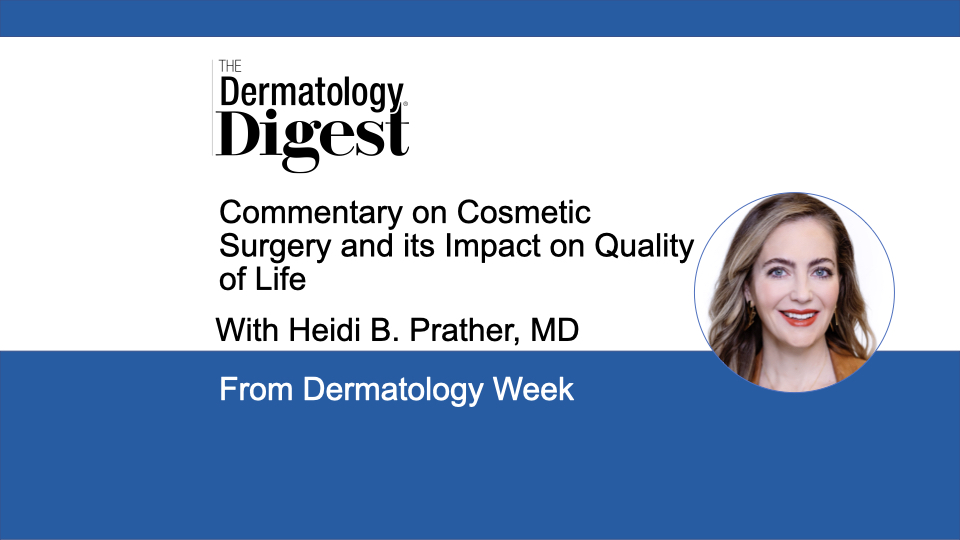Dr. Heidi Prather discusses the impact of dermatology treatments on quality of life and considerations for a broader definition of patient “health.”
Heidi B. Prather, MD, Cosmetic Dermatologist, Westlake Dermatology, Austin, Texas
“… I started out really looking into the quality-of-life improvement on aesthetic patients within dermatology through a research project called IMPACT,” said Heidi B. Prather, MD, who presented “Cosmetic Surgery and its Impact on Quality of Life” at this year’s Dermatology Week conference.
IMPACT, or Impact Measurement on Patients After Cosmetic Treatments, a prospective, multisite survey of fellowship-trained dermatologists, measured quality of life using a validated scale to qualify how patients felt posttreatment, said Dr. Prather.
“We found that over 80% [of patients] really were driven to do these treatments with a goal of achieving improvement in self-confidence and self-esteem. And, further, we found that these goals were being reached.”
Patients not only experienced improvement in personal and professional relationships, but they also felt younger and more attractive, she said.
More Than Cosmetic: Redefining ‘Health’
In an even broader sense, “When we look back at what the World Health Organization uses to define health, it’s really a state of complete physical, mental, and social well-being. It’s not defined by just the absence of disease.”
Together, these various perspectives create a bigger picture, said Dr. Prather, a concept she calls “authentic” health.
“… I think this is a new area that only has room to grow and [allows us to] expand our knowledge base on how we really impact patient’s lives through aesthetic and medical [dermatology] treatments.”
Specifically, it is well documented that treating skin issues including acne, melasma, pigmentary disorders, such as vitiligo, and psoriasis can have a profound effect on mental health because disease resolution can change how patients view themselves and perceive other’s view them, said Dr. Prather. Unfortunately, the reverse is also true and undertreating or withholding treatments due to access or awareness can be detrimental to psychological well-being and skin issues can significantly contribute to depression, poor marital relationships, and suicidal thoughts.
“What does quality of life impact look like for patients suffering from acne? What does it look like for patients suffering from depression, from pigmentary disorders where they feel self-conscious because they have vitiligo or melasma or other skin issues that might be perceived as distracting…?”
As physicians, we are trained to treat the whole person. But often, we are focused on the diagnosis and treatment plan that it can be easy to overlook the secondary aesthetic effects, and therefore psychological impacts, on what are otherwise considered medical dermatology issues, said Dr. Prather.
“But what’s great is this standard of looking at quality of life as a measureable outcome is really being embraced, I think, across the field and really across all specialties. And we have so much great data on psoriasis… as well as [on] the pigmentary disorders, and how this impacts marriages, relationships, depression for the patients.”
The dermatology specialty has learned even more with research support through our industry partners, said Dr. Prather.
“They have dug deeper and found that even people who have treatment-resistant major depression have improvement in depression scores from just treating glabellar frown lines with neurotoxin.”
Looking beyond what has been traditionally defined as “cosmetic” is complex, for example, the neuro-psychosocial feedback cycle is our subconscious internal process that determines if what we see is consistent with what we feel, and paradoxically what we see influences how we feel, said Dr. Prather.
“What does our brain tell us when we see ourselves frown? What [are] the chemical pathways that are activated when we’re holding tension in those muscles that are telling us that we’re upset or depressed or angry?”
Both the mind and body work in harmony and create a synergistic effect of physical treatment on mental well-being that now allow us to view treatments with one other parameter, quality of life impact, said Dr. Prather.
“I think superficially we all notice it and feel better through self-care, but it takes a lot of science to take a step back and ask, well, what really is that impact?”
According to Dr. Prather, her ultimate goal is to minimize the division and distance between medical and aesthetic dermatology by removing any negative stigma to the perception of aesthetic treatments.
“Dermatologists are always wearing two hats… cosmetic patients need skin checks and to address their medical dermatology needs. Similarly we should not withhold discussions around ‘cosmetic’ treatments for our medical dermatology patients when what we do can improve their quality of life ….”
Disclosure: Dr. Prather is a clinical investigator for Galderma and Merz and on the Speakers Bureau and advisory boards for Allergan, Endo Aesthetics, Galderma, La Roche Posay (L’Oreal), Merz, Revelle, Revision, and SkinCeuticals (L’Oreal).


